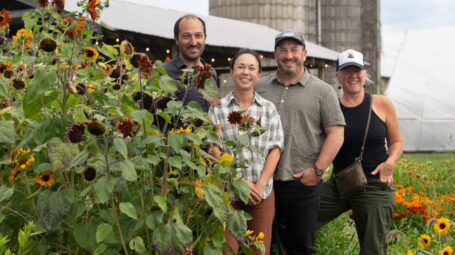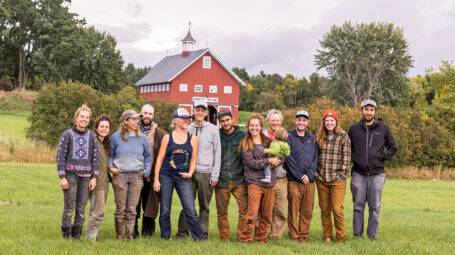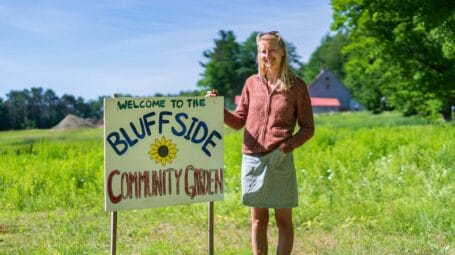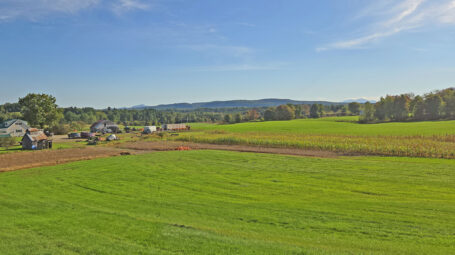Marshfield farmers find land and a bountiful future
9 min read / November 11, 2025 / By Laura Hardie
Our website uses cookies to improve your experience. To learn more about how we use cookies, please review our privacy policy.
Can't find what you're looking for? Please contact us.
9 min read / November 11, 2025 / By Laura Hardie
Conservation — and a lot of hard work — helped Kagan Dewey and Elise Magnant make their farm dreams a reality.
This story is part of our 2024-2025 Annual Report. Read more about the places and people we worked with here.
“The first five years were the hardest I’ve ever worked in my life,” said Kagen Dewey.
For those five years, Kagen and his partner Elise Magnant grew vegetables on leased land in Plainfield, putting in relentless 12-hour workdays.
They built their business — Blackbird Organics — from their shared dream, but without land of their own, the future always felt uncertain.
“We put so much into building our business, and then when land access didn’t seem like it was going to be possible for us, we had some serious conversations saying maybe farming isn’t for us and we should move on to the next thing.”
Photo: Elise and Kagen at the farm
The turning point came when VLT’s Farmland Access Director Maggie Donin connected them with Dorigen Keeney, who had over 70 acres of conserved farmland in Marshfield. Dorigen was keen that the land host a working farm, again.
Before selling the property to Elise and Kagen, Dorigen worked with us to add new protections so that it will remain available, and more affordable, for future farmers.
Elise and Kagen finally had land of their own.
“Farming is not the most profitable business in the world, and land prices are really high. In the normal real estate market, farmers just cannot compete,” Kagen said. “Working with the land trust was crucial.”
Buying land reshaped what was possible.
“On leased land, our business growth was slow and didn’t create enough profits for infrastructure improvements,” Kagen said.
“We had a laundry list of investments, and we were, like, okay, if we did this, this, and this, our business could scale up and our quality of life would improve, but I’m not pouring concrete onto a property I don’t own,” he explained of their inability to construct a more efficient wash and pack facility for their produce.
Once they knew the Marshfield farm would be theirs, everything changed.
“With so much less anxiety, we took out loans to make improvements,” said Kagen. “We had written business plans of possible futures, and we finally got to be like, cool. This is the one. This is the plan.”
Photo: Kagen harvests basil on the farm.
The results came quickly. They turned hayfields into rows of organic vegetables, added manure to build soil health, built a new wash-pack facility, put up three greenhouses with buried utilities, and installed irrigation.
They started a CSA at the new property and have grown it to 35 members. If they meet their projections for 2025, their third growing season on their own land, they will produce two and a half times the dollar value of their leasing years.
Being owners also means they can provide stable jobs. The farm now supports three employees, including one who was able to transition from part-time to full-time work and move into housing on the property.
“There’s a trickle-down effect of stability,” Elise said. “Our employees feel invested in the work because they know this farm isn’t going anywhere.”
Community members have also cheered them on. Rich Christensen, the former owner of Plainfield Co-op and Hardware, who grew up nearby, told Kagen that as a boy, he would drive his tractor past the fields and imagine them planted with sweet corn.
“He watched it being hayed for 40 or 50 years, always thinking, ‘I bet it would grow great sweet corn,’” Kagen recalled. “The first time I delivered sweet corn to his store, he told me how excited he was to see it finally growing here.”
Photo: (L to R) Zoe Winchell, Ellen Nolan, Jim Grimes, Elise Magnant, Kagen Dewey, Rebecca Waldo; with Raven, Becca’s dog.
The couple’s vision goes beyond their own business.
“I’m most passionate about regionalizing the food system,” Kagen said. “Every head of lettuce we grow here is a head of lettuce that doesn’t need to sit on a truck for 2,000 miles,” Kagen said.
They supply the Plainfield Co-op and Hunger Mountain Food Co-Op in Montpelier and sell at an area farmers’ market.
They partner with a gleaning program, Community Harvest of Central Vermont, and participate in food assistance initiatives like Crop Cash and NOFA-VT’s Farm Share, which make it easier for Vermonters with lower incomes to buy local, organic food.
Elise added, “We want it to be for our whole community. Taking organic vegetables out of the niche market and into the mainstream market.”
For Elise and Kagen, conservation was the difference between being able to farm or not.
“If it wasn’t conserved, we wouldn’t be here — we wouldn’t be able to afford it,” Kagen said.
Sam Smith, Farm Business Specialist at the Intervale, which supported the farm in business planning through VLT’s partnership with the Farm & Forest Viability program, put it this way:
“The greatest threats for new farmers are land costs and competition from development, along with increasingly volatile weather and labor challenges. The greatest reward we can aim for is supporting them to realize their dreams of owning a farm and making enough to support their families.”
Conservation is one crucial tool. “Our land is secure and the costs are fixed, so we can actually engage in long-term financial planning,” Elise said.
Kagen added, “And when it comes our turn to retire… this land will be more financially accessible to the next generation of farmers after us.”
“We understand how hard it is for beginning farmers like Kagen and Elise to find and buy land, even after they’ve established a business over a few years,” said VLT’s Maggie Donin. “We also see productive farmland being removed from food production, for a variety of reasons. So we try to provide the right conservation support at the right time: making the connection between beginning farmers who have started their business, like Kagen and Elise, and someone selling farmland. While holding legal protections on the property that are specifically intended to keep it available for future farmers and make it more affordable.”
Photo: farm employees Zoe Winchell (left) and Rebecca Waldo (center) show off recently harvested produce with Elise.
Blackbird Organics continues to grow. Elise and Kagen plan to expand their CSA, increase overall production, find ways to bring more people to the farm, and keep investing in soil health and infrastructure.
All with hopes that they can pay it forward.
“We were really lucky the way we started farming, with a long-time farmer in Johnson at Foote Brook Farm,” Elise reflected.
“That’s where we learned a lot of our foundations. We’d like to scale up enough so we could potentially provide mentorship for the next generation. To create a place where someone can earn money, but also learn to become a farmer themselves.”
All photos by Kyle Gray.





We generally send two emails per month. You can unsubscribe at any time.